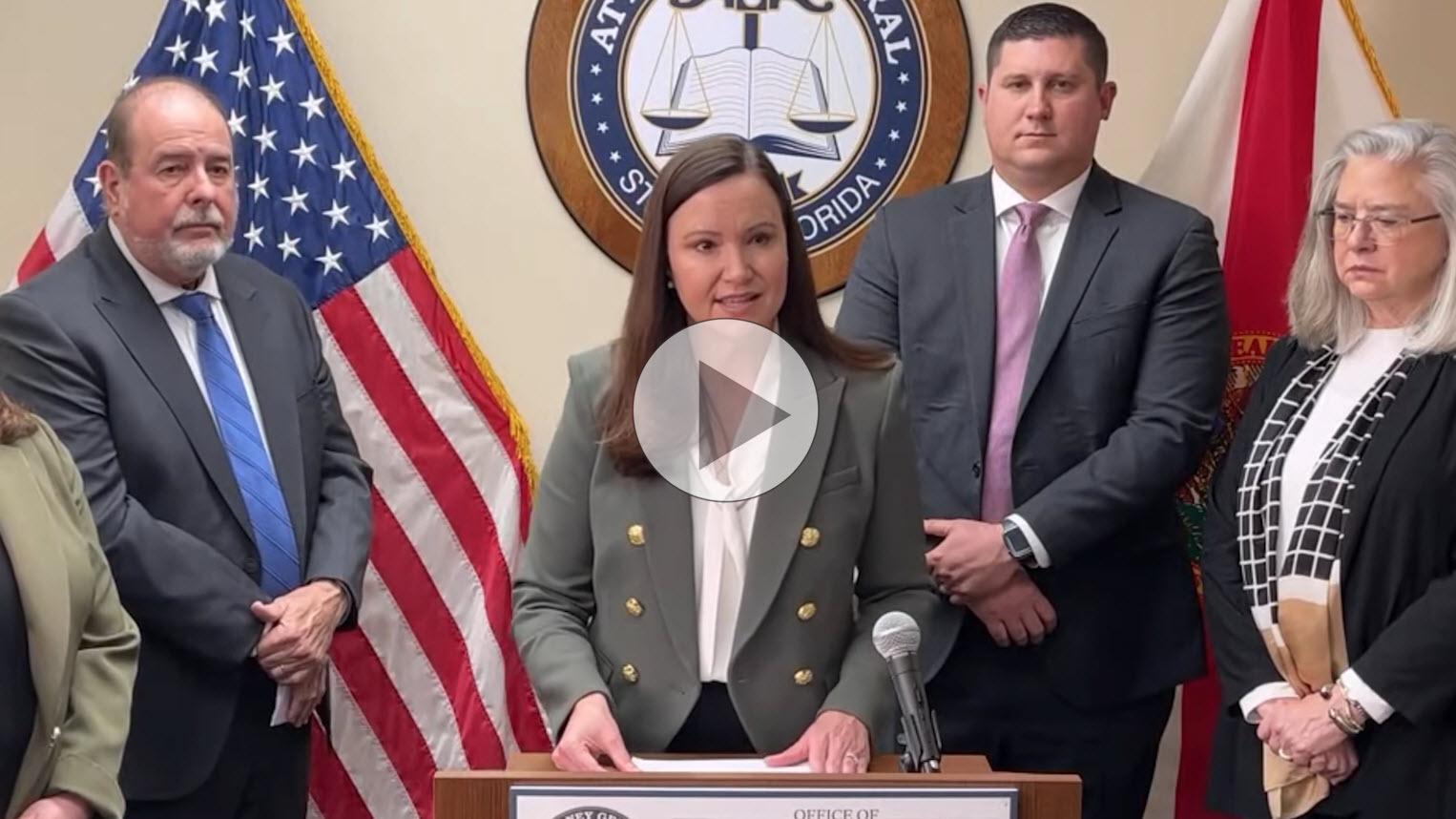VIDEO: AG Moody Releases Scams at a Glance: The Dark Side of Solar During National Consumer Protection Week
TALLAHASSEE, Fla.—Attorney General Ashley Moody today released Scams at a Glance: The Dark Side of Solar during National Consumer Protection Week. At a news conference in Jacksonville with the Better Business Bureau, Attorney General Moody unveiled the new resource that provides Floridians with crucial information needed to avoid scams when purchasing solar energy systems. This new resource comes months after Attorney General Moody filed legal actions against three solar companies for alleged deceptive and unfair trade practices.
Attorney General Ashley Moody said, “Home solar energy systems can present utility savings opportunities, but bad actors may use the enticement of big savings to secure large down payments with no intention of ever completing the solar installation process. Solar scams cost Florida consumers thousands of dollars. To better protect Floridians, this National Consumer Protection Week, I’m releasing Scams at a Glance: The Dark Side of Solar. This new resource is full of tips to help consumers spot and avoid solar scams.”
BBB Northeast Florida President and CEO Tom Stephens said, “The BBB has been working to help develop a marketplace where buyers and sellers can trust each other for over 100 years. The celebration of National Consumer Protection Week is another step along that path.”
Scams at a Glance: The Dark Side of Solar provides consumers with information to recognize, avoid and report fraudulent practices while looking to install solar panels. The tool includes a list of warning signs for potential deceptive practices and scams, as well as tips for purchasing from legitimate solar companies.
For more details from Attorney General Moody on Scams at a Glance: The Dark Side of Solar, click here.
Tips to avoid scams listed in Scams at a Glance: The Dark Side of Solar include:
- Beware of solar companies advertising as being a government-affiliated entity;
- Get quotes from several reputable solar companies and compare offers;
- Know that not all consumers will be eligible for rebates, utility incentives and other appealing perks;
- Be cautious of companies requesting large upfront payments or deposits;
- Understand that all solar installations require a permit and inspection before the system can be connected to the utility company;
- Contact the Better Business Bureau to see if any complaints have been filed about a certain company;
- Read and understand all terms in the contract. Pay attention to warranties, cancellation policies, payment schedules and any hidden fees; and
- Ask for written copies of all contracts to review prior to signing.
For more tips and information, download Scams at a Glance: The Dark Side of Solar by clicking here. To access the guide in Spanish, click here.
Recent legal actions taken by Attorney General Moody against deceptive solar businesses include:
- MC Solar and Roofing: A Tampa-based solar company that allegedly scammed hundreds of consumers, including seniors, persons with disabilities and veterans. Attorney General Moody filed a lawsuit after receiving reports that the company abandoned contracts, damaged homes and forged applications. The company also allegedly filed liens on homes and even threatened consumers with legal action, despite the fact that many consumers never received a working solar system.
- SetUp My Solar: The owners of this company allegedly used high-pressure sales tactics and misrepresented to consumers the possible savings, quality of equipment and potential tax rebates for purchasing systems. Consumers reported the company failed to complete or properly install systems, causing failed inspections and damage to consumers’ homes. The defendants also allegedly bundled the solar equipment with additional items, such as water heaters and air conditioning units, without having the proper licenses and permits required for installation.
- Vision Solar: This company sold solar panels to hundreds of consumers, allegedly promising solar energy benefits and certain timelines for project completion. Consumers instead reported experiencing extensive delays and damage. The company also allegedly failed to successfully complete the permit requirements in setting up consumers’ solar grids, resulting in more delays for the customers.
To report a solar scam, contact the Florida Attorney General’s Office at 1(866) 9NO-SCAM or online at MyFloridaLegal.com. Consumer complaints can also be filed with the BBB here.
Scams at a Glance is an outreach program with information about common and emerging scams. The downloadable brochures are designed to teach consumers how to avoid falling victim to fraudulent schemes. To learn more, click here.
# # #


